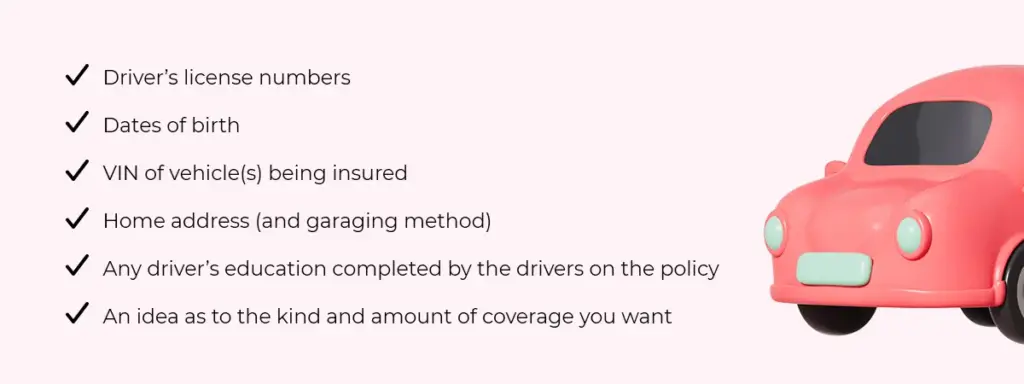Buying your first car is exciting! While it’s a huge responsibility to own, maintain, and take care of your own vehicle, it’s also an opportunity for you to enjoy greater independence and the freedom of being able to go wherever you want whenever you want.
Before you get behind the wheel your new ride, like all drivers in Ontario, you’ll need to purchase auto insurance. Here’s what you need to know about insuring your first car.
Have you been insured before?
Although this might be the first time you’re insuring your own car, you may have been insured before under someone else’s auto policy. Insurance companies will count your driving history from when you were first insured, regardless of whether you were the one who purchased the policy, until now.
Lapses in coverage or a gap where you weren’t insured can affect your rate – but only if it was because of a cancellation, license suspension, fraud, or another negative cause. If your lapse was for an innocent reason, such as or working from home temporarily without the need to drive, you may not be subject to a rate increase.
If you were previously insured under someone else’s policy, another thing you’ll need to keep in mind is that you will now be responsible for making your own payments. If you elect to do automatic withdrawals, you’ll need to always ensure that your bank account always has sufficient funds. Cancellation due to non-payment can seriously impact your future insurability and the price of your coverage.
Do you need “full car coverage?”
When getting insurance for your first car, you’ll need to make decisions about the kind and amount of coverage you want. If you’ve bought your car from a dealership brand new, odds are that your lease agreement will require you to purchase “full car coverage.”
While there’s no such thing as “full car coverage,” most dealerships and financing companies require their customers to purchase collision and comprehensive insurance. There is a tremendous difference in protection between purchasing the bare minimum, provincially required insurance (accident benefits, uninsured motorist, third-party liability, etc.) and purchasing a policy with “all the fixings,” including optional coverages like collision and comprehensive. Collision insurance ensures that even in an at-fault accident, the driver is covered for the physical repairs for the vehicle, where comprehensive coverage reimburses the driver for damages due to hail, fire, flooding, vandalism, and theft.
Other optional endorsements that are often highly recommended (but not legally required) for new car owners are accident forgiveness (OPCF 39) and a limited waiver of depreciation (OPCF 43). Accident forgiveness prevents a first at-fault claim from impacting your insurance rates, whereas a limited waiver of depreciation ensures your insurance company does not deduct depreciation for your vehicle for up to three years after its purchase. This means that if your car is written off after being deemed unrepairable, you’d get the full purchase amount back to replace it with a similar make/model.
Is liability-only coverage enough?
New drivers insuring their first cars may face higher insurance premiums due to their lack of experience. This might lead to the temptation to opt for just liability coverage to meet the provincial mandatory requirements and avoid extra costs.
Doing so usually isn’t recommended, since you’d be left without coverage if you caused an accident or were even partially at-fault. If you’d opted out of DC-PD coverage as well, you would have very limited physical protection altogether and may be left with having to pay the repair costs out-of-pocket.
Work with a broker to find affordable, yet robust insurance to protect you in all situations. A broker can advise you on what the best course of action would be for your situation.
What do I need to get insurance for a first car?

Before speaking with a broker to buy insurance for your first vehicle, be sure to have the following information on-hand – both for yourself and anyone else who will be driving the car:
- Driver’s license numbers
- Dates of birth
- VIN of vehicle(s) being insured
- Home address (and garaging method – private garage, driveway, street parking, etc.)
- Any driver’s education completed by the drivers on the policy
- An idea as to the kind and amount of coverage you want
Chances are that if you’re a new driver (and especially if you don’t have your full G license yet), or you’ve only driven someone else’s car for a couple of years before purchasing your own, you’ll end up paying more for your auto insurance. The less driving experience you have, the more likely you are to make mistakes – or at least you are in the eyes of the insurance company.
In addition to your driving experience and record, insurance providers will also price your coverage based off the following information:
- The kind of car your drive (make, model, year)
- Your age and gender
- Postal code of your primary/home address
- How far the car will be driven per year
- How long your daily commute is
- What level of driver’s license you have
If you’re new to buying insurance, you might have heard a few myths about what influences the cost of your coverage. To straighten some things out: no, the colour of your car has no effect on your rates. Your race, education, and having parking tickets also will not affect your insurance rates.
Talk to Mitch as a first-time car buyer
One of the best things we can recommend for first-time car buyers is to work with an insurance broker when getting their policy. Our insurance brokers have plenty of experience working with individuals who might be new to insurance and can recommend all the best ways to save on your coverage.
Looking for car insurance?
Speak with a Mitch Insurance broker today to get a quote on Ontario auto insurance.
Call now
1-800-731-2228







